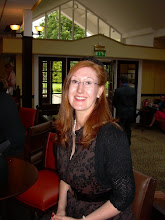 Anyway, after my trip to Russia it's back to work and reality. I was pleased to be invited to attend the Department for Innovation, Universities and Skills Expo 08: One Year On, to celebrate DIUS's anniversary, as a new department, and to have the opportunity to consider what has been done in that year. The first workshop I attended was from Research Councils UK, talking about "Unlocking the Talents of UK Researchers". Obviously, as a (largely unfunded) researcher myself, this was something I was particularly interested to hear about. The speaker gave some background, stating that in terms of bibliometric data, the UK's researchers are second in ranking only the the US, and are the most productive in a G8 country. Moreover, we're international, apparently - nearly half of postgrads and 1 in 7 academics are from overseas.
Anyway, after my trip to Russia it's back to work and reality. I was pleased to be invited to attend the Department for Innovation, Universities and Skills Expo 08: One Year On, to celebrate DIUS's anniversary, as a new department, and to have the opportunity to consider what has been done in that year. The first workshop I attended was from Research Councils UK, talking about "Unlocking the Talents of UK Researchers". Obviously, as a (largely unfunded) researcher myself, this was something I was particularly interested to hear about. The speaker gave some background, stating that in terms of bibliometric data, the UK's researchers are second in ranking only the the US, and are the most productive in a G8 country. Moreover, we're international, apparently - nearly half of postgrads and 1 in 7 academics are from overseas.The research councils' missions are to support research excellence (good!) However, as the speaker admitted, although the seven research councils cover all possible areas of research, there is still an emphasis on STEM subjects (science, engineering, technology and mathematics). Research, it seems, still equals science. All seven councils have common missions (which I believe can be found on the RCUK website, if you care!)
RCUK have three particular ways of helping researchers: Providing skills/skilled people; stimulating ideas, and providing opportunities. The skills aspect is largely about training, it seems, and the skills needed by researchers include: research techniques, entreprenerial skills, public engagement, management, personal effectiveness, communication skills and networking. Fair enough - mostly. However, I am a little more dubious about aligning research with public policy - yes, to a certain extent that helps to put the universities on the agenda and ensures that much-needed research is being done. But that must not be at the cost of "blue skies" research, in any discipline. (Kind of related to this, an interesting article in the Times Higher talks about universities' role in working with innovation). There are six programmes running involving three or more research councils, and they are: Living with environmental change; Energy; Ageing: Lifelong health and wellbeing; Global Uncertainties: security for all in a changing world; Digital Economy; Nanotechnology through engineering to application. All worthy, but you know, I don't see much room for Victorian poetry, heritage, culture etc there.
In fact, I was at the Expo as part of a panel, representing the National Student Forum - and if you don't know what that is, hopefully you will do soon as we are about to release a report. We're 16 students from across the UK, working with DIUS to represent the student voice, and, building on reports from Student Juries across the country, help the government tackle issues such as finance, teaching standards, employability, accomodation, information and support, etc. We had a session in the afternoon with Baroness Morgan, Minister for Students, who has been immensely supportive of us, and it was great to see that so many of the delegates are genuinely interested in helping to make the lives of students better.











No comments:
Post a Comment